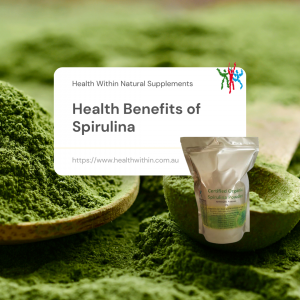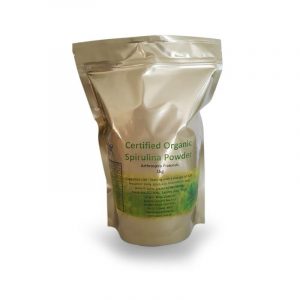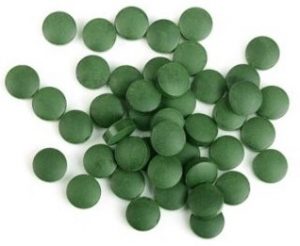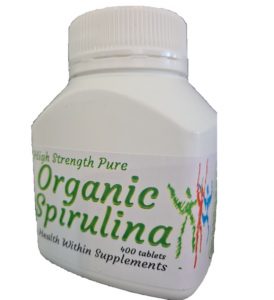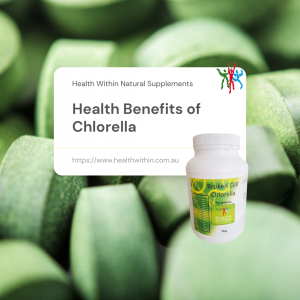What Is Spirulina
Spirulina is a type of blue-green algae that is largely considered a superfood due to its excellent nutritional content and health benefits. It has a high protein and vitamin content, which makes it an excellent dietary supplement for people on vegetarian or vegan diets. Research suggests that spirulina has a wide range of benefits, including antioxidant and inflammation-fighting properties, as well as the ability to help regulate the immune system.
This dark green coloured blue-green algae is a complete, balanced protein with a wide range of valuable nutrients. Spirulina protein is 95% digestible compared to meat sources, which are often difficult for the body to break down. In fact, beef protein is estimated to be only 20% digestible. So spirulina is a wonderful way to consume high quality protein that’s easy on the body.
It also contains 18 out of 22 amino acids and all of the essential amino acids, making it a unique vegetarian source of complete protein. In addition, it is particularly high in beta-carotene. Beta carotene converts into vitamin A in the body. Vitamin A is essential for healthy eyes, skin, teeth, nails, hair, bones and a strong immune system. It is also an an excellent source of B vitamins, particularly vitamin B12, as well as vitamin E. Spirulina is a highly bio-available source of iron, containing 14 naturally chelating (heavy metal removing) minerals and numerous trace elements. In addition to being one of the most nutrient-rich foods on earth, Spirulina is low in fat, calories and cholesterol.
Health Benefits of Spirulina
There are many fantastic health benefits of Health Within Spirulina! Here are 12 of them.
1. Excellent Nutritional Profile
Consuming Health Within Spirulina is one way to supplement protein and vitamins in your diet without side effects. One tablespoon or 7 grams (g) of dried Health Within Spirulina contains:
- 20 calories
- 4.02 g of protein
- 1.67 g of carbohydrate
- 0.54 g of fat
- 8 milligrams (mg) of calcium
- 2 mg of iron
- 14 mg of magnesium
- 8 mg of phosphorous
- 95 mg of potassium
- 73 mg of sodium
- 0.7 mg of vitamin C
It also contains thiamin, riboflavin, niacin, folate, and vitamins B-6, A, and K. Taking Health Within Spirulina, as part of a balanced diet, helps you stay well nourished.
2. Losing Weight
People can usually lose weight if they eat fewer calories than they use. Health Within Spirulina is a high-nutrient, low-calorie food that contains a lot of nutrition in a small amount of powder. Introducing spirulina to the diet may help people lose weight without losing nutrition.
The results of a 2016 double-blind placebo-controlled trial showed that spirulina may aid weight management. In the study, people who were overweight and regularly ate spirulina for 3 months showed improved body mass index or BMI. Anecdotally, many people also find that when they eat Spirulina before a meal, it satisfies appetite. This allows you to reduce overall food consumption.
3. Improving Gut Health
Health Within Spirulina can be digested easily because of its structure where the cells do not have tough, fibrous walls. Studies indicate spirulina may support gut health as people age. A 2017 study on older mice suggests that spirulina may preserve healthy gut bacteria during the aging process.
4. Managing Diabetes
Health Within Spirulina shows promise as a way to manage the symptoms of diabetes. A 2018 study found that spirulina supplementation significantly lowered people’s fasting blood glucose levels. High fasting blood sugar is a common problem in people with diabetes type 1 and 2. This suggests that Health Within Spirulina supplements may help people control diabetes. These results suggest that spirulina shows promise as a food to support type 2 diabetes management.
A 2017 study also supports the idea that spirulina may help manage diabetes. In this study, the researchers gave mice with type 1 diabetes spirulina extract orally. As a result, the mice showed:
- lower blood sugar
- higher insulin levels
- improved liver enzyme markers
The researchers note that the antioxidant effect of spirulina may be helpful in treating type 1 diabetes.
5. Lowering Cholesterol
Studies suggest that Health Within Spirulina supplements can reduce total cholesterol. Cholesterol is an unhealthful fat in a person’s blood that medical experts link to heart disease.
A 2016 systematic review and meta-analysis suggests that taking spirulina supplements may have a positive impact on blood lipids, which are fats in the blood. In the study, spirulina was found to significantly reduce total cholesterol and lower LDL — “bad” — cholesterol while increasing HDL — “good” — cholesterol.
A 2013 study also supports this health claim. Researchers found that taking 1 g of spirulina every day reduced participant’s total cholesterol after 3 months.
6. Reducing Blood Pressure
As discussed above, Health Within Spirulina may lower cholesterol, and there is also evidence that it could help control a person’s blood pressure. A 2016 study found that eating spirulina regularly for 3 months reduced people’s blood pressure when they were overweight and had hypertension.
7. Preventing Heart Disease
High blood pressure and cholesterol levels are both linked to heart disease. As Health Within Spirulinamay reduce both of these risk factors, is it possible that it could help prevent heart disease? A 2013 study suggests that these blue-green algae may play a role in preventing heart disease. This might be due to their cholesterol-lowering, anti-inflammatory, and antioxidative effects.
8. Boosting Metabolism
Taking Health Within Spirulina may help boost your metabolism. A higher metabolic rate may make a person feel as if they have more energy. It may also increase the number of calories they burn each day, which may aid weight loss. In a 2014 study, people who took 6g of spirulina a day experienced beneficial metabolic effects, alongside weight loss and better health-related quality of life.
9. Reducing Allergy Symptoms
When a person has allergies to pollen, dust, or pets, the inside of their nose may swell. This reaction is called allergic rhinitis. There is some evidence that spirulina could help improve the symptoms of this condition. A 2013 study states that spirulina can relieve nasal inflammation and reduce histamine in the body. Compared to a placebo, it may reduce the symptoms of allergic rhinitis, including:
- runny nose
- sneezing
- nasal congestion
- itching
A 2011 review also noted that there is a reasonable amount of evidence for the positive effects of spirulina on allergic rhinitis.
10. Antitoxic Action
In certain parts of the world, people are at risk of poisoning from contaminated drinking water and other sources of pollutants. Research suggests that Health Within Spirulina may offer a way to treat those affected. A 2016 study found that spirulina had antitoxic properties that could counteract pollutants in the body, including:
- arsenic
- fluoride
- iron
- lead
- mercury
The authors of the review suggest that spirulina could be a useful substance to use alongside clinical treatment of pollutant poisoning.
11. Supporting Mental Health
A 2018 paper highlights the potential role that Health Within Spirulina could play in treating mood disorders. The theory is that spirulina is a source of tryptophan. Tryptophan is an amino acid that supports serotonin production. Serotonin plays an important role in mental health.
People with certain mental health conditions, such as depression and anxiety, may have reduced levels of serotonin. Taking tryptophan supplements to maintain healthful serotonin levels may play a role in supporting mental wellbeing.
12. Detoxifying
One reason why green foods are so important is because they are high in chlorophyll. Chlorophyll is the pigment that gives green plants their color. Chloropyll is often referred to as “green blood” due to its oxygen potential. Chlorophyll is also thought to be remarkably cleansing and alkalising and assists in the removal of toxins from the body. Grown in only alkaline waters, spirulina is considered to be alkalising for the body.
How To Include Spirulina In The Diet
You can add Health Within Spirulina powder to smoothies or drinks. As a powder, you can:
- add it to smoothies, which gives the drink a green color
- sprinkle spirulina powder on salads or in soups
- mix it into energy balls, along with other healthful ingredients
- stir a tablespoon into fruit or vegetable juices
Health Within Spirulina is also available in tablet form. We suggest taking a dose of 1 – 6 tablets daily. Be sure to start on a lower amount and gradually workup as Spirulina is a detoxifying and to much to quick may result in adverse detoxification symptoms.
Be sure to source quality, organic spirulina from a trusted supplier to ensure you are getting all the goodness of spirulina, and without any nasty fillers or additives.
Buy your Health Within Spirulina HERE.
